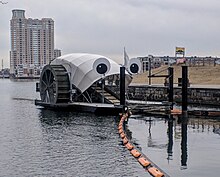Trash interceptor

A trash interceptor is a device in a river to collect and remove floating debris – before the debris flows out into a harbor, for instance.
Mr. Trash Wheel
[edit]
Installed in May 2014, the water wheel trash interceptor known as Mr. Trash Wheel, officially the Inner Harbor Water Wheel, is the world's first permanent water wheel trash interceptor.[1] It sits at the mouth of the Jones Falls River in Baltimore's Inner Harbor. A February 2015 agreement with a local waste-to-energy plant is believed to make Baltimore the first city to use reclaimed waterway debris to generate electricity.[2]
The Jones Falls river watershed drains fifty-eight square miles of land outside of Baltimore and is a significant source of trash that enters the harbor. Garbage collected by Mr. Trash Wheel could come from anywhere in the watershed.[3] Operated by solar and hydro power, the wheel moves continuously, removing garbage and dumping it into an attached dumpster; its daily capacity is estimated at 25 tons. In its first 18 months of operation, it removed more than 350 tons of litter from Baltimore's landmark and tourist attraction, including approximately 200,000 bottles, 173,000 potato chip bags, and 6.7 million cigarette butts.[4][5] The water wheel has been very successful at trash removal, visibly decreasing the amount of garbage that collects in the harbor, especially after a rainfall.[6]
After the success of Mr. Trash Wheel, the Waterfront Partnership raised money to build a second water wheel at the end of Harris Creek, an entirely piped stream that flows beneath Baltimore's Canton neighborhood and empties into the Baltimore Harbor.[7][8] The planned new water wheel was inaugurated in December, 2016, and dubbed "Professor Trash Wheel".[9] Two more trash wheels, "Captain Trash Wheel" and "Gwynnda the Good Wheel of the West", were added in 2018 and 2021 respectively.[10][11]
River Thames passive debris collector
[edit]There are several passive debris collectors (PDCs) on the River Thames in London, including one by the Houses of Parliament. Unlike Baltimore's Mr. Trash Wheel they are totally passive and any debris collected by them must be lifted out by the use of a crane-equipped boat.[12]
See also
[edit]- Bubble curtain – used to reduce liquid or debris floating on the surface from spreading
- The Ocean Cleanup – nonprofit environment organization building interceptors for 1,000 rivers
References
[edit]- ^ Chow, Lorraine (17 December 2015). "Solar-Powered Water Wheel Removes 350 Tons of Trash From Baltimore Harbor". EcoWatch. Retrieved 24 January 2016.
- ^ "Inner Harbor's Amazing Trash Wheel Just Got Better". Baltimore Magazine. February 11, 2015. Retrieved December 22, 2015.
- ^ "Mr. Trash Wheel: Using the Power of Nature to Keep Our Harbor Clean". Waterfront Partnership of Baltimore. Archived from the original on January 13, 2016. Retrieved January 24, 2016.
- ^ Baker, Brandon (June 25, 2014). "How a Solar-Powered Water Wheel Can Clean 50,000 Pounds of Trash Per Day From Baltimore's Inner Harbor". EcoWatch. Retrieved January 24, 2016.
- ^ Clemens, Danny (April 22, 2015). "'Mr. Trash Wheel' Removes 6,700,000 Cigarettes from Baltimore Harbor". Discovery. Retrieved January 24, 2016.
- ^ @MrTrashWheel (18 November 2015). "This is what the harbor used to look like after a rain storm before I arrived on the scene" (Tweet) – via Twitter.
- ^ "Canton Water Wheel". Retrieved January 24, 2016.
- ^ Hodgkins, Kelly (October 15, 2015). "This Autonomous Trash-Collecting Boat Is Making Baltimore Harbor Less Disgusting". Digital Trends. Retrieved January 24, 2016.
- ^ McDaniels, Andrea (December 4, 2016). "'Professor Trash Wheel' makes its debut in Canton". The Baltimore Sun. Retrieved 5 December 2016.
- ^ Robinson, Lisa (5 June 2018). "You can reinvent the wheel: Baltimore welcomes Captain Trash Wheel". WBAL-TV. Retrieved 5 June 2018.
- ^ "Meet Baltimore's Fourth Trash Wheel: Gwynnda The Good Wheel Of The West". 11 March 2021. Retrieved 11 March 2021.
- ^ Cleaner Thames – Port of London Authority passive debris collector takes on Thames litter on YouTube, Nov 30, 2015
